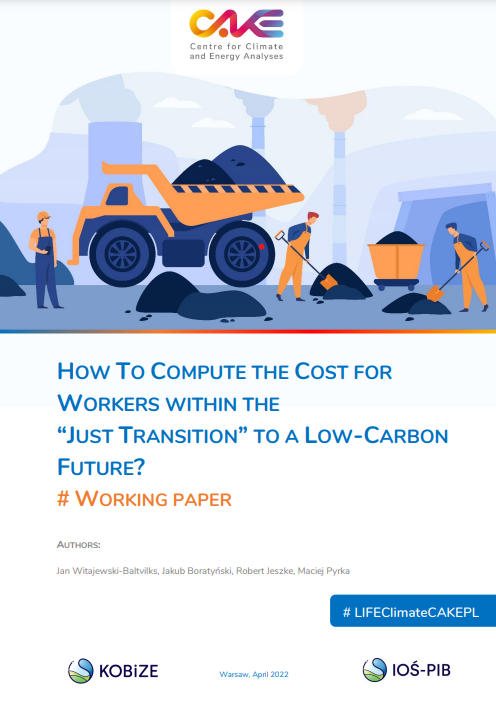New CAKE working paper concerning “Just Transition”
CAKE published working paper titled: How to compute the cost for workers within the “Just Transition” to a low-carbon future?
- WORKING PAPER:
 How to compute the cost for workers within the “Just Transition” to a low-carbon future? (1.1 MiB, 1,000 hits)
How to compute the cost for workers within the “Just Transition” to a low-carbon future? (1.1 MiB, 1,000 hits)
 In this paper CAKE proposes a novel methodology that allows to compute the loss of workers throughout the low-carbon transition. CAKE uses microeconomic theory supported with empirical evidence to argue that for many workers in mining sector their current payoff in mining is significantly larger than their potential payoff in other sectors. Next, CAKE incorporates framework in a numerical economic model to compute the loss of workers throughout the low-carbon transition in Poland. CAKE finds that the costs of transition in Poland will be increasing over time and reach 1% of labour compensation in 2040. The cost associated with the loss of workers who were previously employed in the mining sector would amount to more than US$1.1B, close to 0.5% of total labour compensation in Poland in 2040.
In this paper CAKE proposes a novel methodology that allows to compute the loss of workers throughout the low-carbon transition. CAKE uses microeconomic theory supported with empirical evidence to argue that for many workers in mining sector their current payoff in mining is significantly larger than their potential payoff in other sectors. Next, CAKE incorporates framework in a numerical economic model to compute the loss of workers throughout the low-carbon transition in Poland. CAKE finds that the costs of transition in Poland will be increasing over time and reach 1% of labour compensation in 2040. The cost associated with the loss of workers who were previously employed in the mining sector would amount to more than US$1.1B, close to 0.5% of total labour compensation in Poland in 2040.
Computable General Equilibrium (CGE) models predict that the transition to a low-carbon future generates economic costs because low-carbon inputs cannot substitute for their carbon-intensive counterparts without loss of productivity. CAKE argues that there is an additional cost of transition associated with the movement of labour across sectors. The cost arises whenever sectoral labour supply curves are not perfectly elastic and is substantial when curves are inelastic (which is suggested by the empirical literature). When supply is inelastic, i.e. does not respond greatly to changes in wages, it is likely because, for many workers, the opportunity costs of moving to a new sector are lower than their current wage. Hence, when workers are forced to move, they suffer loss. In this paper, CAKE provides a formal framework linking loss of workers due to the transition to a low-carbon economy with the slope of the sectoral labour supply curve. CAKE shows how one can incorporate the system of supply curves into a standard CGE framework and use it to compute the loss of workers throughout the transition in climate policy scenarios.
Below are the Main conclusions of the paper:
- Low carbon transition requires a radical drop in production of coal and employment in the mining sector.
- We expect that workers in mining who are forced to move to other sectors will receive lower wages than they receive currently.
- First workers who leave mining are those who are indifferent between jobs in mining and jobs in the other sectors. Those who wait are those who expect that their future payoff in the other sectors is significantly lower than their current payoff in mining.
- We use the shape of sectoral labour supply curves to compute the loss of workers throughout the transition.
- The costs of transition in Poland will be increasing over time and reach 1% of total labour compensation in 2040.
- The cost associated with the loss of workers who were previously employed in the mining sector would amount to 0.5% of total labour compensation in Poland in 2040.

 Reset ustawień
Reset ustawień Kontrast
Kontrast Widok
Widok Czytelność
Czytelność Czcionka
Czcionka Znaki
Znaki Interlinia
Interlinia Słowa
Słowa Akapity
Akapity Deklaracja dostępności
Deklaracja dostępności









